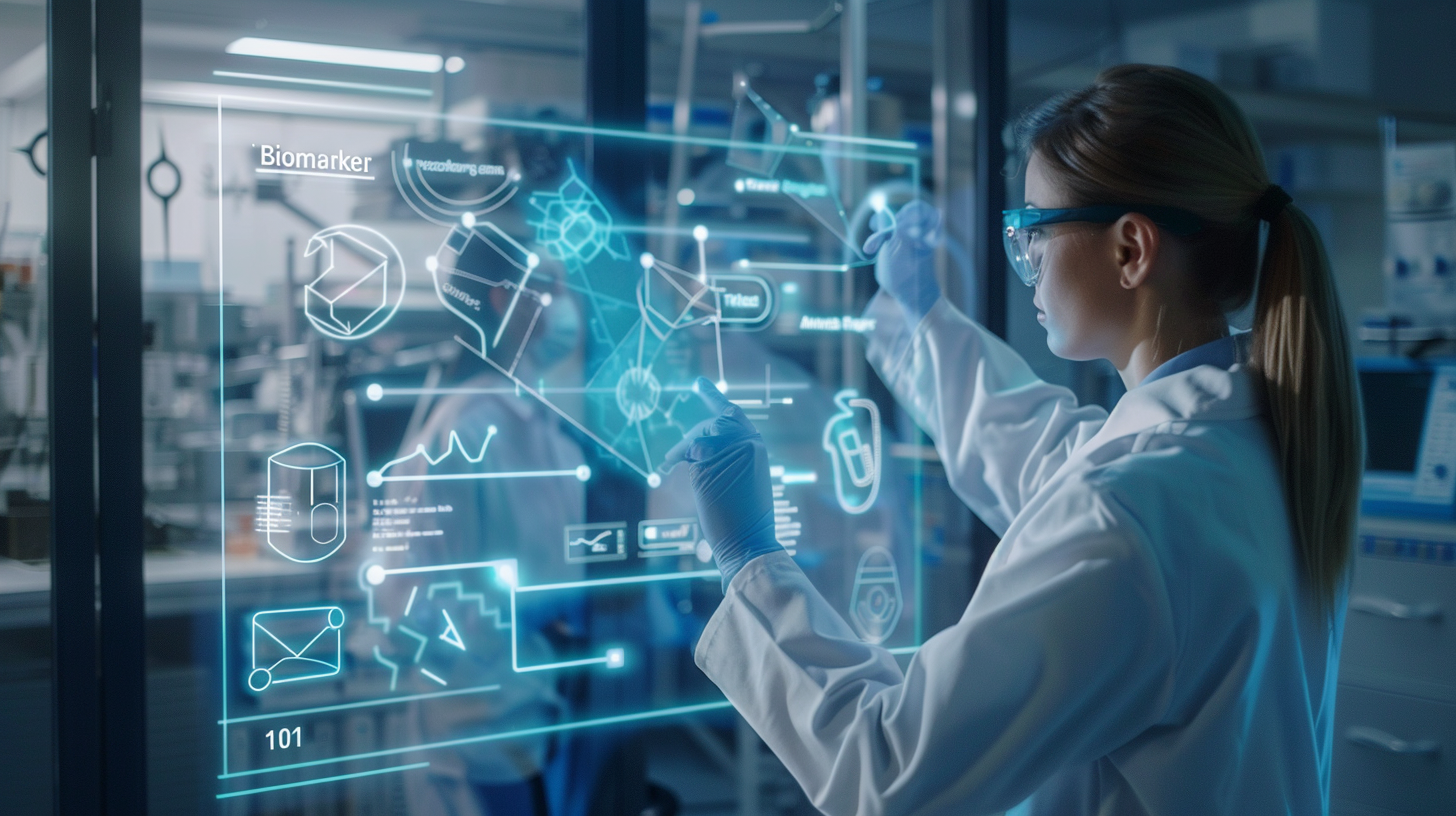🧬 TL;DR: What Are Biomarkers?
- Biomarkers are measurable biological indicators of normal processes, disease states, or treatment responses
- Types include diagnostic, prognostic, predictive, pharmacodynamic, and safety biomarkers
- Applications span drug discovery, clinical trials, precision medicine, and patient monitoring
- AI and advanced technologies are accelerating biomarker discovery and validation
- Biomarkers are essential for personalized medicine and improved patient outcomes
Every drop of blood, tissue sample, and medical scan contains hidden messages about what's happening inside your body. Biomarkers decode these messages, transforming invisible biological processes into measurable data that doctors and researchers use to make life-changing decisions. Yet despite their fundamental importance in modern medicine, many researchers working outside specialized biomarker fields struggle to understand what biomarkers actually are and why they've become indispensable.
Defining Biomarkers: The Foundation
The FDA defines a biomarker as "a defined characteristic that is measured as an indicator of normal biological processes, pathogenic processes, or responses to an exposure or intervention" (FDA-NIH Biomarker Working Group, 2016). Behind this clinical language lies a simple but powerful concept: biomarkers are biological signals that tell us what's happening inside living systems when we can't see it directly.
Biomarkers function like molecular reporters embedded throughout our bodies, constantly broadcasting information about cellular health, disease progression, and treatment effects (Califf, 2018). They replace guesswork with data, transforming medicine from an art based on symptoms and clinical intuition into a science driven by measurable biological reality.
💡 Core Concept: Biomarkers turn invisible biological processes into measurable, actionable information that guides medical decisions and research strategies.
Types of Biomarkers: A Comprehensive Classification
Diagnostic Biomarkers
Diagnostic biomarkers answer the fundamental question: what's wrong? They detect or confirm disease presence, often catching problems before patients feel anything unusual (Strimbu & Tavel, 2010). PSA screening for prostate cancer, troponin testing for heart attacks, and HbA1c measurement for diabetes represent classic diagnostic biomarkers that have transformed medical practice.
The real power of diagnostic biomarkers lies in their ability to spot trouble early or distinguish between conditions that look similar but require completely different treatments. Early detection frequently makes the difference between cure and management.
Prognostic Biomarkers
Prognostic biomarkers predict what's likely to happen next, regardless of treatment (Mayeux, 2004). They help doctors understand disease trajectories and guide decisions about treatment intensity. Oncotype DX testing for breast cancer and various genetic risk scores represent prognostic biomarkers that influence major treatment decisions.
Prognostic information enables personalized care planning and realistic patient counseling based on expected outcomes rather than one-size-fits-all approaches that ignore individual disease characteristics.
Predictive Biomarkers
Predictive biomarkers make precision medicine possible by identifying patients most likely to respond to specific treatments. They match patients with optimal therapies while helping avoid treatments that won't work or might cause harm. HER2 status for trastuzumab therapy and PD-L1 expression for immunotherapy exemplify predictive biomarkers that guide treatment selection.
Beyond effectiveness, predictive biomarkers address safety concerns by identifying patients at risk for adverse reactions, fundamentally changing the risk-benefit calculation for individual patients.
Pharmacodynamic Biomarkers
Pharmacodynamic biomarkers show whether drugs are actually working at the biological level, indicating if medications are reaching their targets and producing expected effects. Blood pressure measurements for hypertension drugs, viral load counts for antiviral treatments, and enzyme activity levels for targeted therapies all serve as pharmacodynamic biomarkers.
These biomarkers enable real-time treatment optimization, allowing doctors to adjust doses, timing, and combination strategies based on individual biological responses rather than population averages.
Safety Biomarkers
Safety biomarkers serve as early warning systems, detecting potential adverse effects before patients experience symptoms. Liver function tests, kidney function markers, and cardiac injury indicators represent established safety biomarkers that prevent serious complications.
In drug development, safety biomarkers prove particularly valuable by catching problems early enough to prevent serious adverse events and guide safe dose selection for clinical trials.
Biomarker Discovery and Development Process
Discovery Phase
Biomarker discovery starts with educated guesses about biological differences between healthy and diseased states, then tests these hypotheses using high-throughput analytical platforms. Modern approaches cast wide nets using genomics, proteomics, metabolomics, and imaging technologies to identify potential biomarker candidates from thousands of possibilities.
Artificial intelligence has transformed this hunting process by analyzing massive datasets and spotting patterns that human researchers would miss entirely. AI systems can process multiple data types simultaneously, revealing complex biomarker signatures that often outperform single markers by capturing disease complexity more completely.
Analytical Validation
Analytical validation proves that your biomarker measurement actually works consistently and accurately. Without solid analytical validation, even the most promising biomarker becomes worthless because nobody can trust the results. The process establishes assay performance characteristics including sensitivity, specificity, accuracy, precision, and robustness.
Standardization becomes crucial here, as biomarkers must produce identical results regardless of which laboratory, platform, or technician performs the test. Regulatory agencies demand extensive analytical validation data before they'll approve biomarker-guided therapies.
Clinical Validation
Clinical validation represents the ultimate test: proving that biomarkers actually improve patient outcomes or clinical decision-making in real-world settings. Large-scale studies with appropriate patient populations and meaningful clinical endpoints become the gold standard for establishing clinical value.
Requirements vary depending on biomarker type and intended use, but success generally demands demonstration of clinical utility through improved patient outcomes, reduced healthcare costs, or enhanced treatment selection compared to existing approaches.
🎯 Critical Success Factor: Successful biomarker development requires seamless integration of discovery, analytical validation, and clinical validation phases with clear regulatory strategy from the beginning.
Modern Applications Across Healthcare
Drug Discovery and Development
Biomarkers have infiltrated every stage of drug development, from initial target identification through post-market surveillance. Early discovery teams use biomarkers to validate targets and understand how drugs work, while clinical development relies on them for patient selection, dose optimization, and effectiveness monitoring.
Integrating biomarkers into drug development reduces the notorious high failure rates in pharmaceutical research, accelerates development timelines, and enables precision approaches that match specific treatments with appropriate patient populations instead of hoping one-size-fits-all solutions will work.
Clinical Trial Design
Modern clinical trials increasingly depend on biomarkers for patient selection, endpoint assessment, and safety monitoring. Biomarker-guided trials achieve superior success rates compared to traditional designs by enrolling patients most likely to benefit from investigational treatments rather than testing everyone and hoping for the best.
Adaptive trial designs use biomarkers to modify study protocols based on accumulating evidence, optimizing efficiency and reducing costs while maintaining scientific integrity. It's smarter trial design that responds to data in real time.
Precision Medicine Implementation
Biomarkers deliver on precision medicine's central promise: the right treatment for the right patient at the right time. Genomic biomarkers guide cancer therapy selection, pharmacogenomic markers optimize drug dosing, and monitoring biomarkers track treatment responses to enable real-time adjustments.
Precision medicine expansion beyond oncology into cardiology, neurology, psychiatry, and other therapeutic areas depends entirely on developing and validating biomarkers across diverse disease contexts.
Technology Platforms and Measurement Methods
Molecular Biomarkers
Molecular biomarkers encompass DNA variants, RNA expression profiles, protein levels, and metabolite concentrations that can be measured from blood, tissue, and other biological samples. Advanced sequencing technologies, mass spectrometry, and immunoassays enable comprehensive molecular profiling that reveals disease signatures invisible to traditional approaches.
Multi-omics strategies combine molecular biomarkers across different biological layers, creating comprehensive disease signatures that capture complexity far better than single-marker approaches ever could.
Imaging Biomarkers
Imaging biomarkers extract quantitative information from medical scans using MRI, CT, PET, and specialized imaging techniques. They provide non-invasive insights into tissue structure, function, and metabolism that complement molecular measurements without requiring biopsies or blood draws.
Radiomics and AI-powered image analysis mine quantitative features from medical images, creating imaging biomarkers that frequently outperform traditional radiological interpretation for diagnosis and prognosis.
Digital Biomarkers
Digital biomarkers harvest data from smartphone sensors, wearable devices, and other digital health technologies that continuously monitor physiological parameters, activity patterns, and behavioral indicators. They enable remote monitoring and real-time health assessment outside clinical settings.
The continuous, accessible nature of digital biomarkers makes them particularly valuable for chronic disease management, clinical trial monitoring, and population health surveillance that would be impossible with traditional biomarker approaches.
Current Challenges and Future Directions
Standardization and Harmonization
Biomarker standardization represents one of the field's biggest headaches. Different laboratories, platforms, and protocols frequently produce varying results for the same biomarker, undermining confidence in the measurements that medical decisions depend on. International efforts focus on developing standard operating procedures, reference materials, and quality control programs.
Harmonization initiatives aim to ensure biomarker measurements mean the same thing across studies, institutions, and countries, enabling broader clinical implementation and regulatory acceptance. Without standardization, promising biomarkers remain trapped in research limbo.
Regulatory Frameworks
Regulatory agencies continue adapting frameworks for biomarker evaluation and approval, trying to balance innovation encouragement with patient safety requirements. The FDA's biomarker qualification program and similar international initiatives provide structured pathways for biomarker validation and clinical implementation.
Evolving regulations for AI-discovered biomarkers, digital biomarkers, and companion diagnostics create both opportunities and challenges for developers navigating increasingly complex regulatory landscapes.
🔮 Future Outlook: The convergence of AI, multi-omics technologies, and digital health will enable biomarker discovery and application at unprecedented scale and precision.
Getting Started with Biomarker Research
Essential Knowledge Areas
Researchers entering biomarker science should develop expertise in:
- Statistical methods for biomarker validation
- Regulatory requirements for biomarker development
- Analytical technologies for biomarker measurement
- Clinical applications and implementation strategies
- Data analysis and interpretation techniques
Key Resources and Tools
Success in biomarker research requires access to specialized databases, analytical platforms, statistical software, and regulatory guidance documents. AI-powered research assistants increasingly help researchers navigate the vast biomarker literature and identify relevant studies for specific applications, accelerating the research process significantly.
Collaboration with multidisciplinary teams including clinicians, statisticians, regulatory experts, and technology specialists dramatically enhances biomarker development success rates and eventual clinical impact.
The Role of AI in Modern Biomarker Research
Accelerating Discovery
Artificial intelligence has fundamentally changed biomarker discovery by analyzing massive datasets, identifying complex patterns, and generating novel hypotheses at speeds impossible for human researchers. Machine learning algorithms process multi-omics data, medical images, and clinical records simultaneously, discovering biomarker signatures that traditional approaches would never find.
AI-powered literature analysis helps researchers stay current with rapidly expanding biomarker knowledge, identify gaps in existing research, and design more effective validation studies that build on previous work rather than repeating mistakes.
Enhancing Validation
AI improves biomarker validation through advanced statistical methods, automated quality control, and predictive modeling that optimizes study designs while reducing validation timelines. These capabilities prove particularly valuable for complex multi-biomarker signatures and rare disease applications where traditional validation approaches struggle.
The Bottom Line
Biomarkers represent the foundation of modern precision medicine, transforming invisible biological processes into measurable data that guides medical decisions and research strategies. Mastering biomarker types, applications, and development processes becomes essential for researchers seeking to advance healthcare through data-driven approaches.
The rapid evolution of biomarker technologies, driven by AI advancement and multi-omics integration, creates unprecedented opportunities for researchers to discover and validate biomarkers that address unmet medical needs. Success requires understanding both scientific principles and practical implementation challenges.
For researchers ready to explore biomarker applications, combining domain expertise with appropriate technology platforms and AI-powered research assistance can dramatically accelerate discovery and validation while improving the likelihood of clinical success and patient impact.
References
- FDA-NIH Biomarker Working Group. (2016). BEST (Biomarkers, EndpointS, and other Tools) Resource. Food and Drug Administration. PMID: 27010052
- Califf, R.M. (2018). Biomarker definitions and their applications. Experimental Biology and Medicine, 243(3), 213-221. PMID: 29405771
- Drucker, E., & Krapfenbauer, K. (2013). Pitfalls and limitations in translation from biomarker discovery to clinical utility in predictive and personalised medicine. EPMA Journal, 4(1), 7. PMID: 23442883
- Goossens, N., et al. (2015). The role of biomarkers in precision medicine. Expert Review of Precision Medicine and Drug Development, 1(1), 103-119. PMID: 26618152
- Mayeux, R. (2004). Biomarkers: potential uses and limitations. NeuroRx, 1(2), 182-188. PMID: 15717018
- Strimbu, K., & Tavel, J.A. (2010). What are biomarkers? Current Opinion in HIV and AIDS, 5(6), 463-466. PMID: 20978388
- Zhang, A., et al. (2014). Biomarkers and precision medicine: from population to individualization. Journal of Personalized Medicine, 4(1), 1-4. PMID: 25562358
- Aronson, J.K., & Ferner, R.E. (2017). Biomarkers—a general review. Current Protocols in Pharmacology, 76(1), 9.23.1-9.23.17. PMID: 28150904


